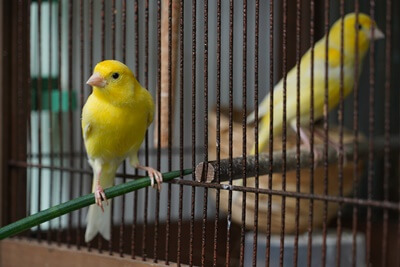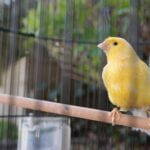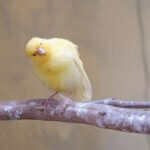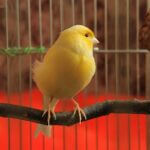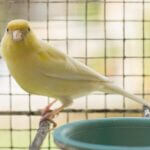Last Updated on: 8th November 2023, 12:15 am
Canaries are popular songbirds known for their beautiful singing. Something that often surprises first-time owners is how much canaries sing.
Canaries sing more than usual when bored or happy, trying to attract mates or establishing territory.
Male canaries sing more than females. Even when there aren’t other canaries present, males will still be driven to sing because they’re bred with that objective.
A canary’s day-to-day activities, breed, and environment affect how loudly and frequently a bird sings.
Even the amount of sunlight influences a canary’s singing habits because they’re so sensitive to the amount of natural sunlight they get.
When Do Canaries Start Singing?
Canaries begin to sing at around three months old. They start with short, quiet chirps and eventually learn to sing entire songs.
Wild canaries learn how to sing primarily from their father. Male canaries take on an active role in chick-rearing, so they’re around for long enough that their young learn from them.
If a canary isn’t raised around other canaries, it would still learn to sing by imitating the sounds it hears because singing is an innate ability in songbirds.
Canary vocalization has three phases:
- Imitation phase.
- Practice phase.
- Mastery phase.
The imitation phase takes place at around three months of age. During this phase, the canary will try to imitate the sounds it hears from other adult canaries or its environment.
At first, the canary isn’t very good at imitating, and its vocalization will sound like warbling. Its voice quivers often, and the songs are short during this phase.
The practice phase begins at around 5-6 months of age. During this phase, canaries will experiment with longer songs and more complex vocalizations. At this point, they learn and memorize from other sources instead of other adult canaries.
After 8-12 months, the canaries master their singing and can sing for longer.
Do Male or Female Canaries Sing?
Both male and female canaries sing, but males sing more than females.
Male canaries use vocalization to attract mates and establish territory. After around 8-12 months, wild canaries become sexually mature and frequently sing to attract mates.
If male canaries are around, they’ll use vocalizations to intimidate the other male.
This doesn’t mean female canaries don’t sing. You can train a female canary to sing, but her singing may be shorter and less frequent than a male.
According to Johns Hopkins University, the nucleus in charge of song production in songbirds is smaller in females than males. However, male canaries have periods when they sing less or don’t sing.
Regardless of gender, some canaries won’t sing until they’re accustomed to their new environment. If you have a new canary, don’t worry if it doesn’t sing as soon as you bring it home.
Do Canaries Sing When Happy?
Singing is one of many ways that canaries express happiness and contentment. It’s natural for them to do so when they aren’t trying to communicate with other canaries.
Canaries have also been in the pet trade for centuries, so many are bred to sing a lot.
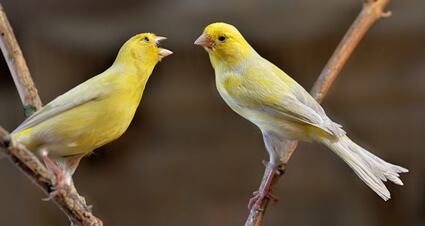
Why Do Female Canaries Sing?
Female canaries sing because it is an innate ability all canaries have.
Even though wild female canaries don’t need to use their singing abilities to attract mates and fight with other birds, they still sing occasionally when feeling happy.
Female canaries chirp more than sing. Also, they lack the capacity for long-form singing like males, so they aren’t bred for it as much as male canaries.
Because female canaries don’t feel the need to sing, they only do so to express happiness. This doesn’t mean your female canary is unhappy if she doesn’t sing.
All canaries have silent periods that last from weeks to months, especially female canaries.
Do Canaries Sing All Year Round?
Male canaries can sing year-round, but there are periods when they sing less. How frequently they sing is dependent on how much daylight they get.
Canaries are native to the Macaronesian Islands but have been bred in captivity in Europe since the 17th century. They live in environments where daylight hours and climates change according to the season.
Canaries sing less during the summer when the days are longer because they need to conserve their energy for molting. They sing more during the Spring when the days are longer, and food is abundant.
According to Rockefeller University, the forebrain nucleus responsible for song production shrinks considerably during the late summer. If your canary stops singing, it’s a normal part of its molting-mating cycle.
Because a canary’s behavior relies on daylight changes, you could accidentally put them in a constant state of wanting to mate. To maintain its natural molting-mating cycle, you must give the canary as much sunlight as wild canaries experience.
Failure to do so could make your bird sing more than it should. While it’s true that canaries sing a lot, their singing isn’t supposed to be constant year-round.
Why Does My Canary Sing at Night?
A canary may sing at night because it’s bored or part of its regular bedtime routine. To know why your canary does it, you’ll need to analyze its behavior and the way you care for your canary.
If your canary is bored at night, it could be because its biological clock is confused. You shouldn’t put your canary on a strict bedtime schedule where you place it in its cage at the same time year-round.
Instead, establish a bedtime routine based on natural daylight hours. So, if sunset is at 8 pm during the summer and 5 pm during the winter, you should put your canary to sleep around those times.
Not doing so can disrupt your canary’s sleeping schedule and keep it active and awake as it sits in its cage. It’ll get bored with nothing better to do than sing into the night. If your canary continues singing long after the lights are off, you’ll want to change its bedtime routine.
Other canaries like to sing at night as part of their bedtime routine. It could be singing if you speak to your canary before bed because it knows you’re receptive to its vocalizations at night.
Do All Canaries Sing Beautifully?
All canary breeds sing, but some are more prone to serenading than others.
The canary breeds that are best known for melodic singing include:
- American Singer.
- Russian Singer.
- German Roller.
- Spanish Timbrado.
- Waterslager.
Meanwhile, other popular canary breeds that can sing but do so less often include the following:
- Gloster.
- Yorkshire.
- Hazer.
Some canary breeds sing less often and less beautifully due to how they’re bred. Some canaries are explicitly bred to sing as beautifully as possible, while others are bred for their plumage.
The canaries bred for their plumage will sing less often, and their vocalizations will be more chirp-like.

